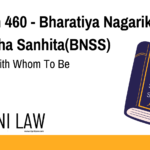Limitation Starts from the Last Act of Cruelty
The Bombay High Court recently ruled that the limitation period under Section 468 of the CrPC for an offence under Section 498-A IPC begins from the last act of cruelty. A division bench of Justices Vibha Kankanwadi and Rohit Joshi clarified that this limitation does not extend indefinitely.
Each Act of Cruelty Resets Limitation Period
The bench stated that each act of cruelty provides a new starting point for limitation. However, extending the limitation period indefinitely would make Section 468 CrPC ineffective, which was not the legislature’s intent.
The court explained that if lawmakers wanted to exclude Section 498-A IPC from Section 468 CrPC, they would have made an express provision.
Case Background
A family filed a petition to quash an FIR registered on January 6, 2023. The FIR was based on an alleged incident of cruelty on October 20, 2019. The court found no material to proceed against the family members, but it examined the case against the husband.
The husband argued that the three-year limitation period applied. He pointed out that the FIR in January 2023 was based on an incident from October 2019. A complaint was also filed with the Women’s Grievance Redressal Cell in November 2022. The charge sheet was filed on January 22, 2023.
The husband contended that since the last act of cruelty occurred in October 2019, the limitation expired in October 2022. As a result, filing the charge sheet and taking cognizance were beyond the legal time frame.
Court Allows Extension Under Section 473 CrPC
The prosecution argued that Sections 468 and 473 CrPC allow an extension of the limitation period if the delay is properly explained or if it serves the interest of justice.
The court noted that the last incident of cruelty occurred in October 2019. However, in March 2020, the COVID-19 lockdown began, and the Supreme Court extended case filing deadlines until June 2022.
Considering these factors, the bench ruled that the case qualified for an extension under Section 473 CrPC. The court stated that taking cognizance was in the interest of justice, despite the limitation expiry.
Limited Delay Not Grounds for Quashing FIR
The court also considered the short delay in filing the FIR. If counted from the November 2022 complaint to the Women’s Grievance Redressal Cell, the delay was less than a month. If calculated from the FIR filing date, the delay extended to about two and a half months.
Even from the charge sheet date, the delay was only three months and ten days. Considering the COVID-19 situation and Supreme Court directives, the court decided not to send the case back to the Magistrate for a limitation ruling. The accused husband failed to prove grounds for quashing the FIR on limitation grounds.
FIR Against Husband’s Family Quashed
While the court refused to quash the FIR against the husband, it dismissed charges against his family members. The bench found the allegations vague, general, and unspecific. It ruled that the complaint was an attempt to implicate the husband’s family in a matrimonial dispute.
The court observed that this case reflected a trend of over-implication in marital disputes. With this conclusion, the court disposed of the petition.








